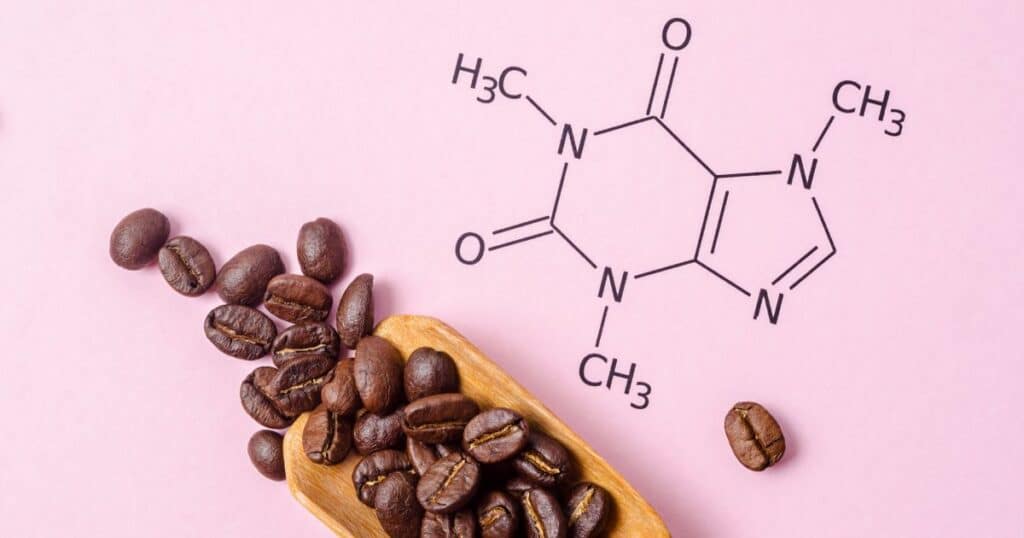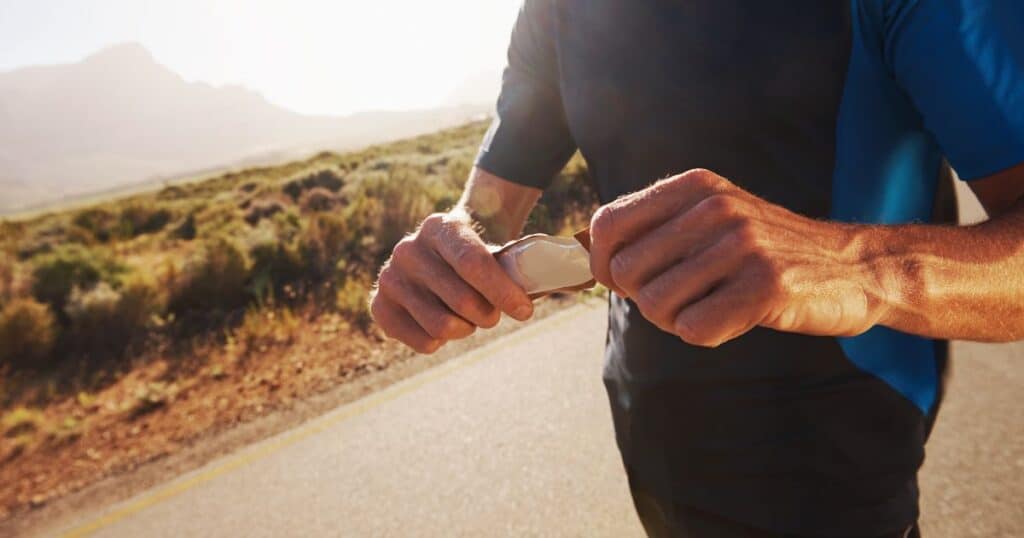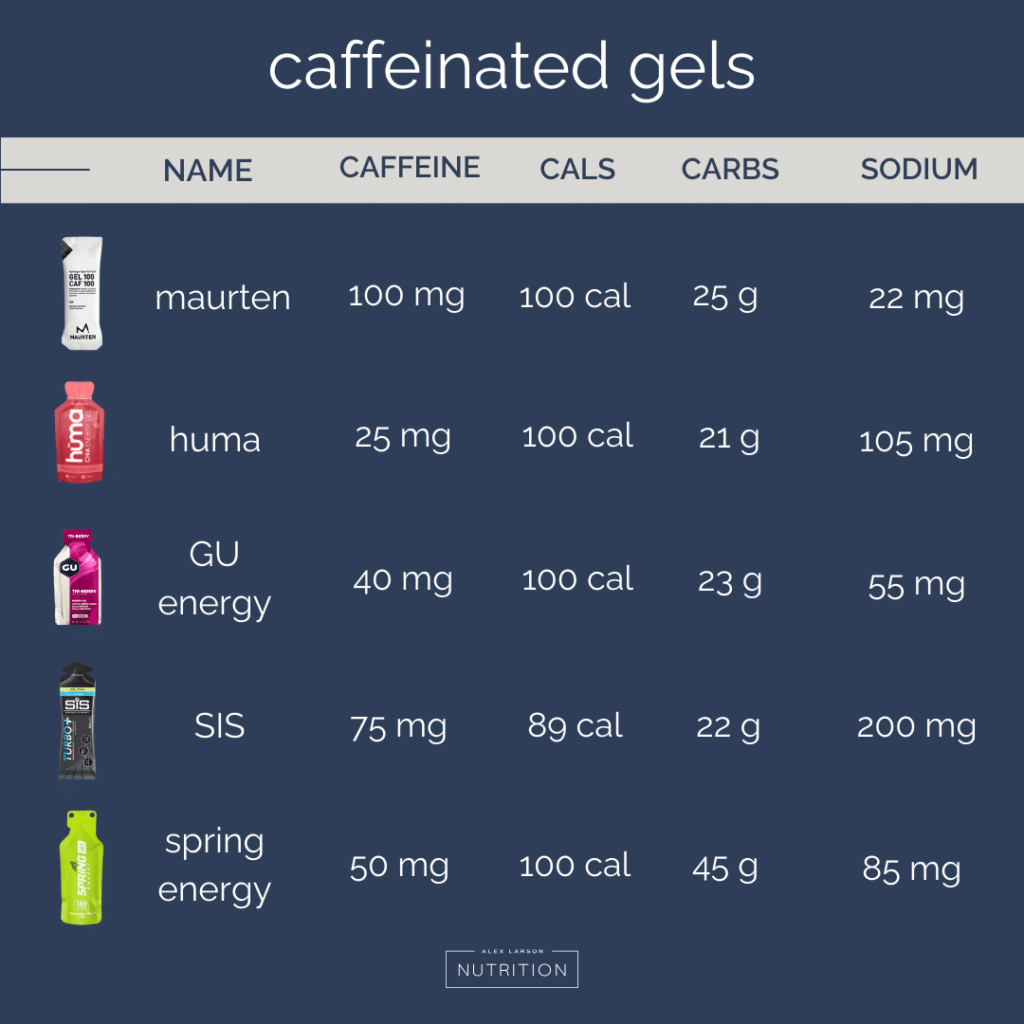RUNNING →
Level Up Your Nutrition Game With Our Freebies
Alex
I provide nutrition coaching for endurance athletes to improve performance and body composition through a simple and flexible eating style.
Hi, I'm
ATHLETE EATING GUIDE →
PROTEIN →
TRIATHLON →
RECIPES →
PERFORMANCE NUTRITION →
SUPPLEMENTS →
HOLIDAY & TRAVEL →
PLANT-BASED →
FEMALE ATHLETE NUTRITION
Explore the Blog
LEARN MORE →
ATHLETE GROCERY SHOPPING GUIDE →
RACE DAY: TRIATHLON NUTRITION PLANNER →
READY TO FUEL?
incredible value!
The fueling guide bundle serves as your one-stop-shop for strategies to fueling before, during and after your workouts.
ENDURANCE EATS
BINGE-WATCH READY!
YOUTUBE SERIES
Caffeine and athletic performance are known to go hand-in-hand. But what positive and negative effects should you be aware of as an athlete?
As with most supplements, caffeine needs to be taken in the right amount at the right time for the best results. Nothing is worse than downing a full cup of coffee before your race and then immediately having to run to the bathroom in the first leg. Yeah, we’ve all been there!
In today’s article, I will be going over the positive and negative effects of caffeine and athletic performance. This includes my best recommendations for caffeine sources, dosages, and timing considerations. Keep reading to learn more!
How Does Caffeine Work?
First off, it is important to understand how caffeine works inside your body. After you take caffeine, it enters your digestive tract, where it gets absorbed into your bloodstream.
Your levels start to rise until they peak about one hour after consumption and stay elevated for 3-4 hours before dropping.
Caffeine stimulates your central nervous system, heart, and muscles. So how does this make you feel less sleepy? Well, your body produces a substance called adenosine that promotes sleepiness. Caffeine blocks your adenosine receptors, keeping you from feeling sleepy.
While this is not the only function inside your body that caffeine acts on, it is one of the primary ways that caffeine promotes focus and provides energy.

Caffeine and Athletic Performance
You may be wondering… how can caffeine impact athletic performance?
Caffeine has been used as a performance enhancer amongst athletes for decades. It is one of the most popular and well-researched compounds in regard to athletic performance. As a team of sports dietitians, many of our clients use caffeine as their go-to supplement choice. And trust me, we get it.
Endurance athletes choose to use caffeine to help power them through a trail run, triathlon, long-distance bike ride, or even a weight-training sesh.
Your first priority as an athlete should be keeping up with your performance nutrition basics and setting a solid foundation. Once you’ve accomplished that, using aides such as caffeine can help take your performance to the next level.
There is quite a bit of misinformation out there surrounding caffeine and athletic performance. So I am going to continue to break down everything you need to know!
Positive Effects of Caffeine
Athletes love caffeine for a reason; it can really have great erogengic effects for athletic performance. Here are a few to be aware of.
Increases focus and alertness
As mentioned above, caffeine stimulates your central nervous system, increasing your focus and alertness. Research from the International Society of Sports Nutrition supports the idea that caffeine can enhance cognitive function in athletes, helping with attention and vigilance.
Being able to dial in and focus during training and races can be very beneficial for your overall performance. Your brain will stay more aware and free of potential distractions that slow you down.

Enhances endurance and stamina
Studies have confirmed that caffeine use can enhance endurance and stamina for athletes. It works by helping your muscles to spare glycogen, your stored form of energy. This delays how fast your glycogen gets depleted, allowing you to train for longer before you reach fatigue.
There is also evidence to support that caffeine reduces your perceived exertion during performances, aka how hard it feels to complete your training or race. If it feels easier, you are likely to have the motivation and energy to keep moving.
Improves strength and power
Caffeine can also improve an athlete’s strength and power. Research studies have demonstrated that caffeine can have meaningful impacts on both upper and lower body strength, as well as power outcomes.
It is important to keep in mind that even a small improvement can give athletes a competitive advantage. I’m sure you’re aware of the benefits of cutting just a few minutes off your race time- it makes a huge difference.
Beneficial for High Heat and Altitude Training
Many athletes train in hot temperatures and high-altitude conditions.
In studies, caffeine proves to be beneficial alongside endurance exercise at a dose of around 1.5 mg-3 mg/lb body weight (3 to 6 mg/kg). If you are planning to train in one of these adverse conditions, a serving of caffeine may help improve your performance.
Caffeine and Dehydration
Worried that caffeine will make you dehydrated? This is actually a myth!
It used to be thought that caffeine can cause fluid loss, like a diuretic. However, the research has found that consuming an appropriate amount of caffeine doesn’t significantly impair hydration status or worsen dehydration. It also doesn’t appear to jeopardize body temp regulation when exercising in the heat.
Negative Effects of Caffeine
There are a few negative effects of caffeine that endurance athletes should be aware of. While everyone will respond differently, in general, most side effects are associated with overconsumption of caffeine (more than ~400 mg/day).
Digestive issues and gastrointestinal distress
Studies have indicated that caffeine, especially coffee, can increase the amount of acid in your stomach, which may cause digestive issues. Symptoms can include nausea, acid reflux, poor digestion, discomfort/bloating, and excessive gas.
If you find that caffeine leads to GI distress before or during training sessions, try lowering the amount and/or using a different caffeine source.

Sleep disruption and insomnia
Another negative effect of caffeine is its potential to disrupt sleep patterns and cause insomnia. Since caffeine is a nervous system stimulant, it makes sense that it isn’t ideal to take it before you are planning to sleep.
A recent 2023 study found that caffeine consumption reduced sleep time by 45 minutes and reduced sleep quality by 7%. It also took participants an average of nine extra minutes to fall asleep and 12 to wake up.
To ensure that your sleep won’t be affected, it is not recommended to take caffeine within ~8 hours of your bedtime. So if you typically sleep around 10 pm, you’d want to stop drinking coffee at around 2 pm.
Dependency and withdrawal symptoms
Dependency on caffeine, especially with habitual caffeine users, is another potential downside. Athletes may find themselves feeling reliant on caffeine for athletic performance.
Additionally, caffeine is known to have withdrawal symptoms when you do try to cut it out. Withdrawal symptoms can include headaches, anxiety, sleepiness, irritability, nausea, tremors, and more.
Understandably these symptoms can greatly reduce your quality of life and affect your training as an athlete. The best way to reduce withdrawal symptoms is to gradually taper off your caffeine intake instead of cutting it cold turkey.
Prefer to listen to nutrition content? Check out the Endurance Eats Video Series!
Check out the ALN YouTube series where my dietitian team and I discuss various performance nutrition topics in depth!
In Episode 6 we discuss the best time to use caffeine in a race!
IN THIS EPISODE:
(0:00) – Welcome
(1:23) – How can you tell the difference between bonking and lack of fitness/fatigue?
(15:00) – When is the best time to take caffeine for a race?
(24:20) – Hypo/hyper/isotonic fuel products – What’s the difference? What should I be using?
Caffeine Dosage and Timing for Endurance Athletes
The dosage and timing of caffeine are crucial for success. How you respond (or don’t respond) to the amount of caffeine is genetic. If you take the wrong amount at the wrong time, you could end up feeling the side effects.
Caffeine Dosage
The recommended performance-enhancing dose of caffeine is about 1.5 mg/lb body weight (3 mg/kg). You can divide this out among your event instead of giving yourself a big jolt at the start.
If you’re going to delay your caffeine until closer to when fatigue starts to appear, then look at ingesting 0.5-1 mg/lb (1-2 mg/kg) body weight.
More caffeine is not better! The ergogenic effect maxes out if you consume more than this amount. You will definitely want to experiment with caffeine dosage amounts during training.
Caffeine Timing
To reiterate, your blood caffeine levels tend to peak about an hour after you take it. It is important to keep this in mind and take your caffeine ~1 hour before you want its effects to peak. However, you can sublingually absorb caffeine in about half of the time with products like caffeinated gum.
The second half of a race is usually when you need that extra “make this feel easier” to keep pushing yourself in the race. Research suggests that timing caffeine closer to your time of greatest fatigue is the most beneficial versus consuming it before the race.
Cutting caffeine to increase effects on race day
Habitual caffeine intake makes it difficult to research its effects in studies. There’s a lot of variability when comparing performance outcomes following caffeine ingestion in habitual versus non-habitual caffeine users. Some athletes may benefit from cutting caffeine prior to race day to increase its effects.
There was one study done that found there was improved performance (3 mg/kg) in trained cyclists when they implemented a 4-day withdrawal on habitual caffeine users.
Another study reported increased endurance in habitual caffeine users (n=6) regardless of a 0, 2 or 4-day abstinence prior.
However, the issue with tapering off caffeine in advance of your race is that you may experience withdrawal symptoms as a habitual user.
I highly recommend trialing this out in your training. You want to find a middle ground between abstaining too long, which causes withdrawal symptoms, and also getting a little extra kick from the caffeine on race day.

Options for Caffeine Sources
As an endurance athlete, you have different options available for how to get caffeine. The caffeine content within sources will vary.
Which one you choose will depend on your personal preference, as well as your desired goals. Some people swear by caffeine pills, while others prefer a simple cup of joe in the morning.
Coffee: 1 cup = ~95 mg
Coffee is one of the most popular caffeine sources. There is nothing wrong with using coffee as an energy source for athletes, but it can be harsh on some people’s stomachs. Especially if you tend to mix your coffee with milk and sugar. It also is not very portable, making is less ideal for intra-workout.
Tea: 1 cup = ~50 mg
Both black and green tea (or matcha) are other common caffeine sources. Since tea is lower in caffeine content, it could be a good option for someone who is looking for only a slight boost.
Energy drinks: 1 can = ~80-200 mg
There are tons of energy drinks on the market geared towards athletes. Make sure to read the labels before purchasing to know exactly what’s inside your energy drink.
Energy drinks are bulky and hard to carry with you on runs, so they may not be the best choice for intra-workout.
Pre-workout powders: 1 scoop = ~150-250 mg
Pre-workout powders are becoming more popular because they often have other performance-enhancing ingredients alongside caffeine. Be cautious with the high caffeine content in pre-workout- some have over 200 mg of caffeine per scoop!
Additionally, beta-alanine is a common pre-workout ingredient that can give you jitters/shakes. These side effects could negatively impact your training/race performance.
Caffeinated gels: 1 gel = ~100 mg
There are a wide variety of caffeinated gels on the market for endurance athletes.
Huma, Maurten, and Gu Energy are three brands that have caffeinated gel options. Check out the graphic below for a quick comparison.

Hydration mixes: 1 pack = ~100 mg
Caffeinated hydration mixes are oral rehydrating solutions that often come in a powdered form. They contain your necessary electrolytes, and some brands put in carbs as well.
Both Maurten and Tailwind have caffeinated hydration mixes.
Caffeine pills: 1 pill = ~100-200 mg
Caffeine pills are an easy and convenient option that you can bring on-the-go with you. They may contain other focus ingredients, such as L-theanine, so make sure to read the label before purchasing.
Caffeinated gum: 1 piece = ~50 mg
Lastly, caffeinated gum is becoming increasingly popular among endurance athletes. RunGum is one well-known brand.
The benefit of caffeinated gum is that it cuts in half how much time it takes to kick into your bloodstream because of sublingual absorption (under your tongue). It also is lightweight and pocket friendly, making it a great option for athletes.
My best advice (as always) is to experiment with various caffeine sources on non-race days. Try it one out, see how it makes you feel, take note of it, and then you can try a different one.
Caffeine and Athletic Performance: The Takeaway
All in all, caffeine is a relatively safe and effective performance enhancer when used properly. As long as you take into account the dosage and timing considerations, there are generally minimal side effects.
Are you feeling lost when it comes to performance nutrition? Are you ready to hit that next PR on race day? Working with a specialized sports dietitian is one of the best ways to maximize your performance as an athlete.
We have limited spots available for our premium 1:1 nutrition coaching services. Make sure to apply today to secure your spot just in time for your next big race! There is no better time to invest in your health.
Alex
I provide nutrition coaching for endurance athletes to improve performance and body composition through a simple and flexible eating style.
Hi, I'm
LEARN MORE →
take the quiz!
Let's discover your Endurance Nutrition IQ
How well do you know your fueling? Answer these questions and let's see where your endurance nutrition knowledge is at!
Take the quiz
level up your nutrition game with these freebies
free downloadS
Protein-Packed 10-Day Sample Meal Plan
Athlete Eating Guide
Athlete Grocery Shopping Guide
1
2
3
Inspiration to fit 120 grams of protein into your day
Planning what goes on your plate
Putting the right foods in your grocery cart
